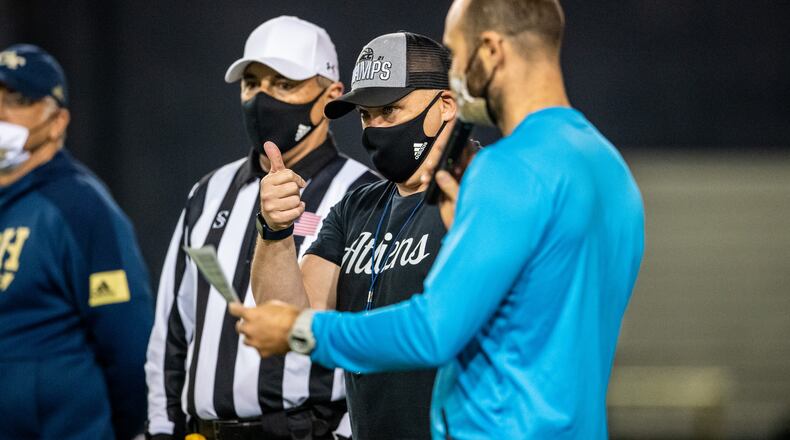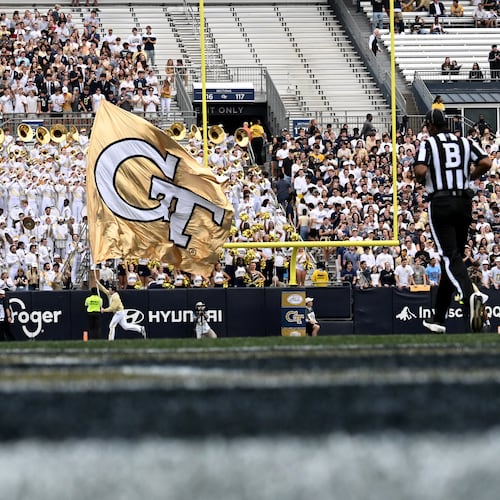When Georgia Tech returned to its practice fields Tuesday morning for the first day of spring practice, the Yellow Jackets were joined by eight officials. And at the end of the practice, coach Geoff Collins read out the list of penalties incurred by his team.
“I think it was eight penalties on offense, five penalties on defense,” Collins said afterwards. “But we’re trying to get that number down, play really clean football, pre-snap, post-snap, and play really, really hard between the whistles.”
“Attention to detail” may be the theme of Collins’ third spring practice with the Jackets. Where Collins had invested his time and attention in the first two offseasons and springs (last year’s spring practice was halted by COVID-19) in instilling the effort, tempo and energy level at which he wanted to conduct practice, he said he’ll turn his focus to detail, particularly the discipline necessary to avoid penalties.
The Jackets demonstrated that discipline in 2019, Collins’ first season. They were 15th in FBS in fewest penalty yards per game (41.1 yards per game), continuing the high standards set by Tech teams during former coach Paul Johnson’s tenure.
Last season, even as the play of the offense and at least some aspects of defensive play improved, Tech fell off a cliff in the penalty department. The Jackets dropped to 119th in FBS out of 127 teams in penalty yardage (74.9 yards per game).
It was not dissimilar to Collins’ two seasons at Temple. A team that was 21st in FBS in penalty yardage in 2016, the Owls were 121st and 114th in 2017 and 2018, respectively.
Out of the 89 penalties that were accepted by Tech opponents, 41 were committed before the snap – 26 false starts, eight offsides, three delays of game, three illegal formations and one illegal shift. By comparison, Tech opponents were called for 16 false starts, 10 of them in the Jackets’ first two games, when teams were perhaps still getting their footing.
With 15 players back who started no fewer than half of Tech’s 10 games in 2020 and the addition of multiple potential starters through the transfer portal, there is reason to be hopeful for Tech to make a marked improvement on its 3-7 record.
“But it’s the attention to detail pre-snap and post-snap that we’ve got to significantly improve in,” Collins said. “Everybody in the organization is committed to it – players, coaches, everybody.”
The outcomes of the 26 false starts speak to the impact that penalties had on the team last season. Three were assessed on fourth downs when Tech was punting. Of the other 23 – called on first, second or third down or fourth down when the Jackets were going for a first down – Tech was able to overcome the five-yard setback and convert a first down in seven of those situations, 30.4%. (Tech’s third-down conversion rate was 41.1%).
Tech punted after nine of the other penalties, lost the ball on downs three times and turned it over twice. All of those failed drives, stunted by the false starts, put back on the field a Tech defense that was second to last in the ACC in third-down conversion rate (46.7%).
The final two false starts out of the 23 were perhaps the two that were most illustrative of the penalties’ impact. Down 20-7 at N.C. State on the opening drive of the second half, the Jackets advanced 74 yards for a first-and-goal on the Wolfpack 1-yard line. However, two false starts in the span of three snaps stalled the drive, and the Jackets settled for a field goal to cut the lead from 20-10 rather than 20-14.
N.C. State went on to win 23-13, but it’s certainly plausible that a touchdown instead of a field goal could have altered the dynamics of the game and offered the Jackets a better chance at a significant upset.
Midway through last season, offensive coordinator Dave Patenaude suggested that the snap count and the cadence of quarterback Jeff Sims were part of what was causing the false-start problem.
Tuesday, Collins said that the team conducted what he termed a “deep dive” into the team’s penalties, looking at each one and trying to understand why they happened.
“We cannot hurt ourselves,” Collins said. “We need to create margin, not give other teams margin.”
This focus on attention to detail has manifested itself in other ways, Collins said. Where practice has generally been saturated with music blasted from a speaker system, Collins said that in 11-on-11 and 7-on-7 work on Tuesday, the music was silenced.
The energy and effort were still present, Collins said, “but the focus piece, the attention-to-detail piece, (we’ve) got to take another step in that direction, and really excited about what we did (Tuesday), and moving forward, as well.”
Other elements of the game will get attention in the spring, like the development of Sims, the play of the defensive line and figuring out how to best use the seven transfers taking part in spring practice.
“But (we) cannot hurt ourselves pre-snap and cannot hurt ourselves post-snap,” Collins said. “And those are big things that we’ve talked about this entire offseason and we’ll continue to drill into the guys as we move forward.”
About the Author
Keep Reading
The Latest
Featured




